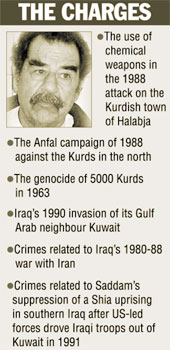 |
Baghdad, June 30 (Reuters): Saddam Hussein, who brutalised Iraqis for decades, said “Good Morning” and sought to ask some questions when the US handed him over to Iraqi justice today, a witness said.
Saddam, who was captured hiding near his hometown of Tikrit in December, looked in good health as he appeared before an Iraqi judge in the first legal step towards a trial for the cruelties he inflicted during his 35 years of power.
“Saddam said: ‘Good Morning’ and asked if he could ask some questions. I think they had to do with whether he would have a right to counsel,” Salem Chalabi, a lawyer leading the work of a tribunal that will try Saddam, said.
“He was told he should wait until tomorrow,” said Chalabi, who was in the courtroom where Saddam and 11 of his former lieutenants were turned over to Iraqi legal custody. The former dictator, who was not shackled when he appeared before the judge, no longer had the long hair and thick beard that shocked Iraqis when they saw him on television after US troops captured him in December.
Many of the other former Iraqi officials were nervous and agitated, said Chalabi, who has received numerous death threats since taking on the task of helping amass evidence against Saddam and preparing a special tribunal to try him.
When investigative judges for the tribunal were chosen, their names were not publicised due to security fears.
Saddam, 67, is accused by Iraqis of torturing and killing hundreds of thousands of people with the help of officials in his Baath party. Saddam became President in 1979, but had already been Iraq’s strongman since a Baathist coup in 1968.
His former lieutenants appeared nervous and some were hostile as they were told they would be charged tomorrow. Such men once petrified Iraqis when they appeared in public.
Ali Hassan al-Majid, known as “Chemical Ali” for his role in poison gas attacks, including one that killed about 5,000 Iraqi Kurds in Halabja in 1988, appeared especially rattled.
“He looked very scared. He was shaking,” said Chalabi.
Saddam once used revolutionary courts to condemn his opponents to death. Thousands of others disappeared. Many were tortured or killed outright, Iraqis say. Saddam will remain in the physical custody of US forces. He and the 11 others are to be charged tomorrow.
Saddam fled when US forces entered Baghdad on April 9 last year after making a final defiant public appearance near a mosque in the capital. The next time he was filmed, he looked disoriented and unkempt with a bushy beard as US military doctors examined him after his capture on December 13.
Among others to be handed over were former deputy Prime Minister Tareq Aziz; Barzan Ibrahim Hasan al-Tikriti, Saddam’s half-brother and adviser; Abid Hamid Mahmud al-Tikriti, his secretary; Sabawi Ibrahim, Saddam’s maternal half-brother; Watban Ibrahim Hasan al-Tikriti, Saddam’s half-brother and adviser; and Aziz Salih Numan, Baath Party regional commander and head of the party militia.
These men and others among the 55 most wanted Iraqis on a US list are seen as witnesses who could help prove a chain of command linking Saddam to crimes against humanity.Saddam will now be subject to Iraqi criminal law, rather than a PoW protected by the Geneva Conventions. His trial is likely to be several months away. Iraq's national security adviser said it would be broadcast live on television.
Iraq's president was quoted as saying the death penalty, suspended during the US-led occupation, would be reinstated and the national security adviser said it could apply to Saddam.
“Tomorrow's proceedings will mark the start of his trial,” said an official in Allawi's office.
Government offices were shut today for a new national holiday declared to mark Monday’s transfer of sovereignty to the interim government.










